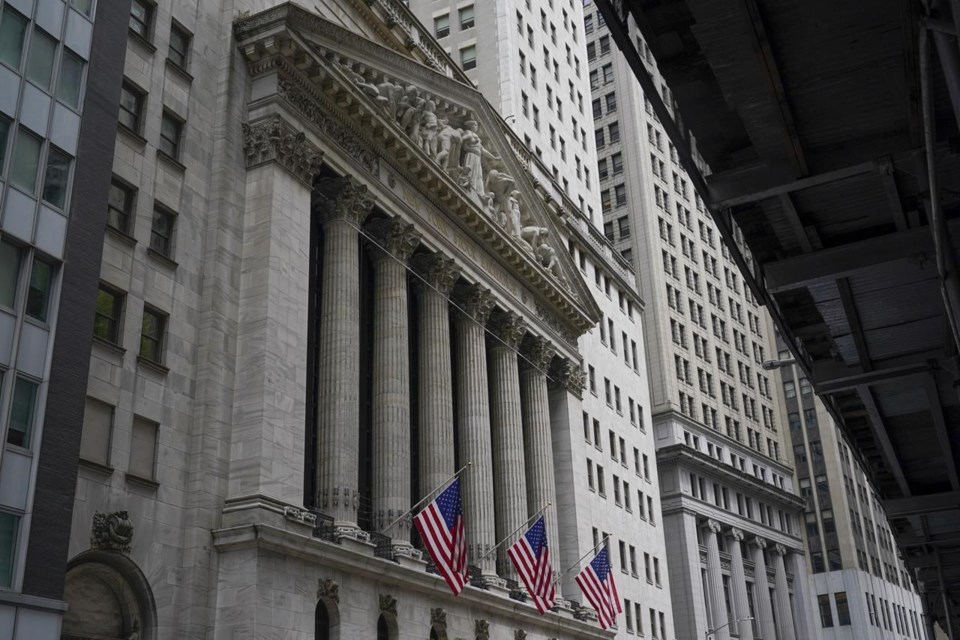TOKYO — Trading is uneven on Wall Street early Wednesday, one day after a rally that was fueled by optimism over economic data suggesting the American economy is in better shape than feared.
Futures for the Dow Jones Industrial Average rose 0.1% before the bell and futures for the S&P 500 ticked down 0.1%.
On Tuesday, the S&P 500 gained 1% and resumed the upward climb that had carried it earlier this month to its highest level in more than a year. The Dow Jones Industrial Average rose 0.6% Tuesday, while the Nasdaq composite gained 1.6%.
Reports on the U.S. economy have been largely stronger than expected. A reading on consumer confidence jumped to its highest level since the start of 2022, and orders for long-lasting manufactured goods unexpectedly grew, beating economists’ forecasts for a pullback.
“Following some early week jitters, we’ve now seen a return to business-as-usual in global equities. Markets are taking some comfort from U.S. economic indicators which are showing no signs of an imminent ‘hard landing’ with regard to growth,” Tim Waterer, chief market analyst at KCM Trade, said in a report.
Sales of new homes in May also topped economists’ expectations, which sent stocks of homebuilders climbing. Such data will feed into decisions by the Federal Reserve and other central banks about whether to keep cranking interest rates higher. High rates can undercut inflation, but they also can slow the entire economy, raising the risk of a recession.
But economists are are increasingly hopeful that a recession may be avoidable, delayed, or that contraction may be limited to specific sectors and not the entire economy.
Despite much higher borrowing costs, thanks to the Fed’s aggressive interest rate hikes, consumers keep spending, and employers keep hiring. Prices for gas and groceries have fallen and the economy keeps managing to grow. And so does the belief among some economists that the United States might actually achieve an elusive “soft landing,” in which growth slows but households and businesses spend enough to avoid a full-blown recession.
Global central banks appear to think that inflation is declining slowly. Hope on Wall Street is that a hike next month could be the final one for the Fed, even if it has suggested recently that it could raise rates twice more this year.
A measure of inflation in Friday's consumer spending report could also play into the Fed's decision.
Major chipmakers slipped Wednesday after the Wall Street Journal reported that the U.S. is considering new restrictions on exports of artificial intelligence chips to China on security concerns. Nvidia and Advanced Micro Devices each fell more than 3% before the bell.
In Europe at midday, France's CAC 40 and Germany's DAX each rose 0.9%, while Britain's FTSE 100 gained 0.7%.
Japan’s benchmark Nikkei 225 jumped 2.0% to finish at 33,193.99. A weakening Japanese yen helped lift exporter shares like autos. Toyota Motor Corp. surged 2.8%, while video-game maker Nintendo Co. edged up 2.0%. A cheap yen raises the value of overseas earnings when converted into yen.
A dollar bought 144.12 yen, up slightly from Tuesday. The euro slipped to $1.0950 from $1.0963.
The recent rise of the dollar against the yen is raising speculation about how that could affect Japanese monetary policy and what it could mean for the economy at a time when inflationary pressures have picked up after years of deflation.
The euro cost $1.0954, down from $1.0959.
Australia's benchmark S&P/ASX 200 jumped 1.1% to 7,196.50 after the government reported that the consumer price index rose 5.6% in the twelve months to May. The most significant price rises included housing and food. The Reserve Bank of Australia made a surprise move of raising interest rate earlier this month to counter persisted price pressures.
South Korea's Kospi lost 0.7% to 2,564.19. Hong Kong's Hang Seng recouped earlier losses, inching up 0.1% to 19,172.05, while the Shanghai Composite was little changed, falling less than 0.1% to 3,189.38.
In energy trading, benchmark U.S. crude gained 12 cents to $67.82 a barrel in electronic trading on the New York Mercantile Exchange. Brent crude, the international standard, tacked on 8 cents to $72.59 a barrel.
——-
Kageyama reported from Tokyo; Ott reported from Washington.
Yuri Kageyama And Matt Ott, The Associated Press



